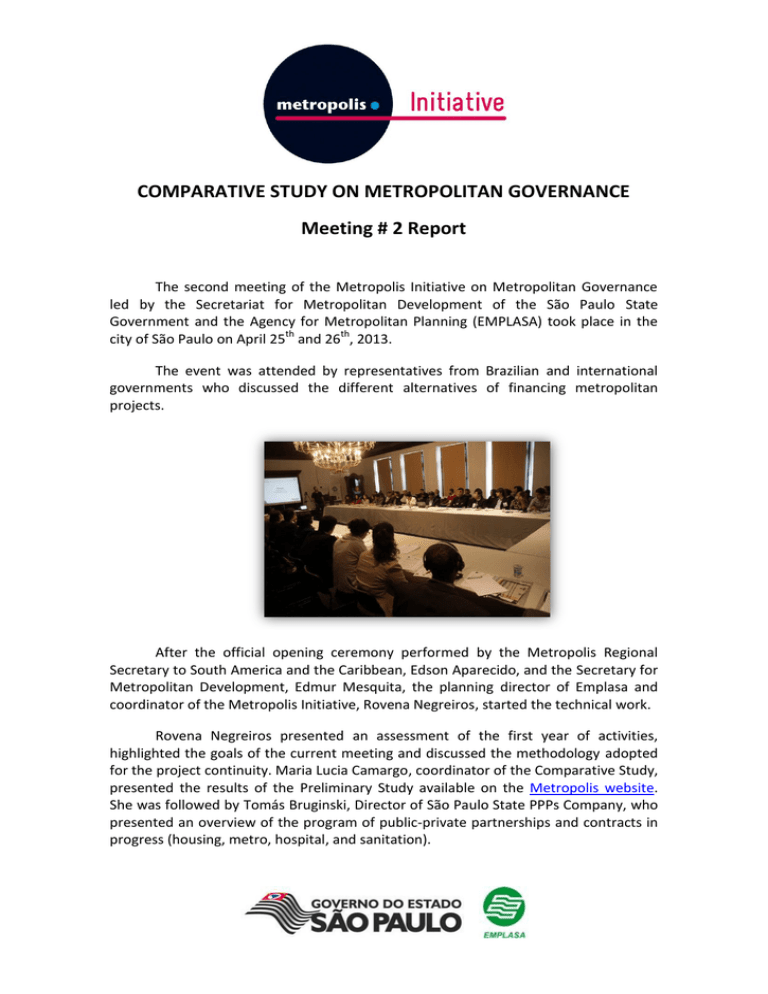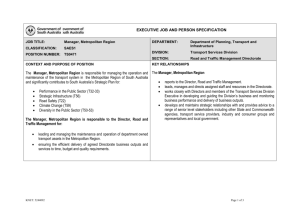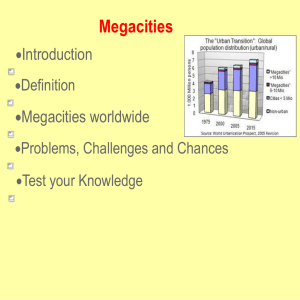COMPARATIVE STUDY ON METROPOLITAN GOVERNANCE Meeting # 2 Report
advertisement

COMPARATIVE STUDY ON METROPOLITAN GOVERNANCE Meeting # 2 Report The second meeting of the Metropolis Initiative on Metropolitan Governance led by the Secretariat for Metropolitan Development of the São Paulo State Government and the Agency for Metropolitan Planning (EMPLASA) took place in the city of São Paulo on April 25th and 26th, 2013. The event was attended by representatives from Brazilian and international governments who discussed the different alternatives of financing metropolitan projects. After the official opening ceremony performed by the Metropolis Regional Secretary to South America and the Caribbean, Edson Aparecido, and the Secretary for Metropolitan Development, Edmur Mesquita, the planning director of Emplasa and coordinator of the Metropolis Initiative, Rovena Negreiros, started the technical work. Rovena Negreiros presented an assessment of the first year of activities, highlighted the goals of the current meeting and discussed the methodology adopted for the project continuity. Maria Lucia Camargo, coordinator of the Comparative Study, presented the results of the Preliminary Study available on the Metropolis website. She was followed by Tomás Bruginski, Director of São Paulo State PPPs Company, who presented an overview of the program of public-private partnerships and contracts in progress (housing, metro, hospital, and sanitation). COMPARATIVE STUDY ON METROPOLITAN GOVERNANCE The first day also included presentations of different partners about their experiences in the field of Metropolitan Governance and financing of projects, especially regarding the different models of public-private partnerships. Experts who developed or implemented projects in metropolitan areas participated as exhibitors: Dr. Andrea Zuberlan, Secretariat of Health of the São Paulo State Government, Gustavo Horta Palhares, Chief of Staff of the Development Agency of the Metropolitan Region of Belo Horizonte; Reinaldo Iapequino, Director of Casa Paulista; Petras Zumpano, Director of the Housing Secretariat at Distrito Federal; Rashid Seedat, Planning Commission of Gauteng; Julián Alvarez Insúa, Secretariat of Planning of the City of Buenos Aires; Mina Sol, Strategic Planning and Management Unit of Rosario, João Paulo Resende, Director of the PPP Unit, Ministry of Planning, Brazil. The presentations are available here. In addition to the exhibitors, an international delegation from the Chinese city of Fuzhou and representatives of Mozambique also attended the event. Representatives of Brazilian metropolitan areas in the states of Goiás and Pará accompanied the event, as well as members of the municipalities of São Paulo, São Bernardo do Campo, São José dos Campos, Campinas, Santos and Curitiba. On the second day of the meeting, the partners gathered to transfer knowledge about the different strategies adopted by cities in relation to their metropolitan structure and to discuss the continuity of the Comparative Study. We also presented the results of the Initiative Evaluation Sheet, completed by each member at the end of the previous day, indicating the themes, sectors of interest and the method for continuing the project. With the results obtained it was possible to set concrete targets for the continuity of the initiative. COMPARATIVE STUDY ON METROPOLITAN GOVERNANCE Main outcomes of the meeting 1. A more comprehensive knowledge about the different forms of financing practiced by members of the Initiative; 2. Critical points about metropolitan governance were identified: a. "Institutionalization is a mean, but not an end." It was noted the existence of formal arrangements / Institutionalized Metropolitan Governance which often lack operational effectiveness. On the other hand, in some situations, informal and collaborative arrangements / non-institutionalized proved to be more effective in implementing metro projects. i. The metropolitan arrangement of Rosario can be cited as an example of a collaborative and informal arrangement - not institutionalized - that has managed to implement projects at the metropolitan level and is now trying to achieve its institutionalization. ii. In the state of Minas Gerais (Brazil), we can identify two types of metropolitan arrangements: one consisting of a voluntary action of contiguous cities that unite to address common problems to their geographic boundaries, not having the institutional character, and another set the creation of the metropolitan agency of Belo Horizonte, coordinated by the state government of Minas Gerais. COMPARATIVE STUDY ON METROPOLITAN GOVERNANCE b. The institutionalization does not necessarily guarantee the efficiency of metropolitan governance. Case studies point to the possibility of creating collaborative governance as an alternative to institutional formations. c. Because they arise from a voluntary union of cities that share common aspirations, informal cooperation agreements can demonstrate efficiency. But they need to achieve institutionalization to last and to dialogue with other levels of government - considering that the lack of legal and political recognition is an element capable of harming the articulation of metropolitan plans. 3. The presence of representatives of Metropolitan Regions at different stages of institutionalization and implementation of projects was important for the discussions. The opportunity to have the presence of cities that have management models and governance more advanced served as a tool to aid the other regions that have not yet implemented their metropolitan projects - to reduce the search time on the most appropriate format and to acknowledge other experiments already implemented; 4. The experiences of urban renewal of Rosario and Buenos Aires were presented as alternative projects to the traditional format of public-private partnerships. Next steps 1. The Initiative will point in the study that PPPs should not be considered as the unique model of funding for metropolitan projects. The study will present cases of project financing through various arrangements, such as partnerships, consortiums, PPP in infrastructure with real estate funds, among others. 2. Use of virtual networks: through a collective discussion, it was decided to create a virtual platform for exchange of information on different topics of metropolitan regions. 3. Considering the financial and geographical boundaries of each member, we believe that technical visits are not the best alternative to follow the initiative, also in view of the different interests of the participants. Still, it was possible to identify the interest of partners, such as São Paulo and Goiania, in visiting the urban renewal project of Rosario (this project will occur in parallel with the Initiative). COMPARATIVE STUDY ON METROPOLITAN GOVERNANCE 4. The Final Version of the Comparative Study on Metropolitan Governance to be concluded in 2014. Are you interested? Please join our next discussion during the next Metropolis Annual Meeting in Johannesburg. We will organize a session called “How can Cities finance their projects? Alternatives for financing urban and metropolitan infrastructure and services” on Wednesday, 17 July 2013, from 14:00 to 17:30. You can find the updated program here.




